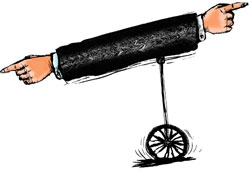 When we warned three years ago on this page about Nepal\'s class war turning into a caste war we had hoped it wouldn\'t be a self-fulfilling prophecy.
When we warned three years ago on this page about Nepal\'s class war turning into a caste war we had hoped it wouldn\'t be a self-fulfilling prophecy.
But the euphoria over the ceasefire of the past nine months is now being replaced by a worrying sense of foreboding about ethnic, separatist, and religious fissures that are opening up beneath our feet. Part of this is caused by reaction and resentment that was welling up after the restoration of democracy. Partly it is also identity politics where the radical fringes of the Maoist and other parties have taken to extreme and militant rhetoric to leapfrog into the political arena.
Whatever the reason, there are ominous signs that unless the legitimate grievances of these groups are addressed quickly the past ten years of war are going to look like a picnic. At its most fundamental, tarai resentment is directed at our traditional ?hill-centred nationalism?. Kathmandu has identified Nepaliness for so long with the hill and himal that we have come to accept it as a given, forgetting that half the country\'s population lives in the tarai. The demographics of the plains have been complicated by Mahendra-era transmigration from the hills and competition for land is now so acute, it is getting entangled with citizenship and representation. 
The Maoists tried to co-opt this with their ethnic autonomy formula, which was really just lip-service because they have already started falling back on Lenin\'s concept of "democratic centralism\'. But having raised false expectations it will be difficult to put the genie back in the bottle, as the militant fringe of chauvinistic groups have seen how potent a political weapon violence is. Even the Maoists may now be unable to control the tarai, Limbuwan, Magarat, and dozens of other ethnic-based demands for independence.
It seems every time negotiations start with one faction, a more hardline splinter group breaks away. Jay Krishna Goit of the TJMM rebelled from the Maoists, and now Jwala Singh has broken away from him. At the root of the crisis is resentment that even the new loktantrik alliance, despite its promises of inclusion and proportional representation, doesn?t allow the people of the tarai fair say in the interim parliament and beyond.
Time is of the essence, because left-wing, right-wing and no-wing extremists want to manipulate genuine grievances for militant politics. In the long-term there must be a system to defuse the explosive ethno-separatist dimension of the current agitation with meaningful regional federalism that translates into true devolution of power and resources away from Kathmandu to the periphery.
Instead of calling for impetuous and irrational shutdowns, the Maoists should be working with the seven parties to put out this flame before it becomes an inferno.


